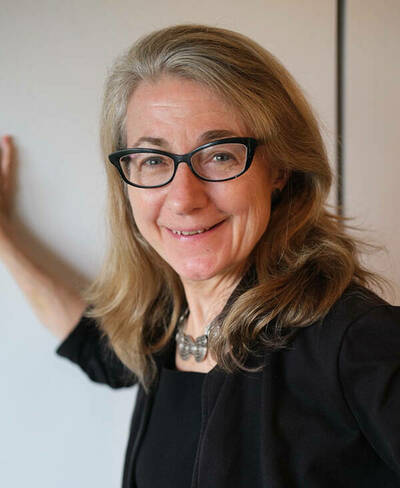ND Expert Julia Adeney Thomas: The reality of the Anthropocene

For the last seven decades, Earth has been operating in unprecedented ways, leading many researchers to argue that we have entered a new geological epoch known as the Anthropocene.
“While it may not have been formally accepted onto the geological time scale, the Anthropocene is real and its effects have drastically and irrevocably changed the living conditions on our planet,” said Julia Adeney Thomas, a professor of history at the University of Notre Dame. “It should therefore be treated as a de facto new epoch of Earth’s history.”
That argument is at the crux of an article published today in the journal Nature and authored by Thomas, Jan Zalasiewicz and Colin Waters of Leicester University, Simon Turner of University College London and Martin Head of Brock University.
The article was also co-signed by more than 50 other researchers representing many different disciplines and institutes from around the world. It summarizes the evidence of massive physical, chemical and biological change on the planet, including the rapidly warming climate.
“For many thousands of years, large human populations coexisted with relatively stable planetary conditions and left abundant traces of their existence and their environmental impacts,” Thomas said. “But the planet is now sharply different, and the significance of these changes extends far beyond the Earth sciences to affect the social sciences, the humanities and arts — and to form a now-permanent context for the work of planners and decision-makers.”
The authors emphasize that it makes sense to precisely delimit the beginning of the Anthropocene at 1952. That year not only marks the prominent upturn of artificial radionuclide fallout around the Earth from hydrogen bomb tests, they note, but closely coincides with many other changes, such as the appearance of plastics and many other novel compounds and the rapid growth of greenhouse gases, as well as widespread social, economic and political changes as the postwar world entered a period of unprecedented growth.
“Wide acceptance of such a definition would make for more precise analysis of the many phenomena associated with the Anthropocene, and allow us to communicate clearly,” Thomas said. “The Anthropocene may have been rejected by the International Commission on Stratigraphy — for now. But it is all too alive in the real world, and we should recognize that.”
Contact: Carrie Gates, associate director of media relations, 574-993-9220, c.gates@nd.edu
Latest Faculty & Staff
- In memoriam: Alasdair MacIntyre, the Rev. John A. O’Brien senior research professor of philosophy emeritusAlasdair MacIntyre, the Rev. John A. O’Brien senior research professor of philosophy emeritus and a permanent senior distinguished research fellow at the de Nicola Center for Ethics and Culture, died on May 21, 2025. He was 96.
- Santiago Schnell, dean of Notre Dame’s College of Science, appointed as provost of DartmouthSantiago Schnell, the William K. Warren Foundation Dean of the College of Science at the University of Notre Dame, has accepted an appointment as provost at Dartmouth College. He will depart Notre Dame at the end of June and begin his new role in July.
- Notre Dame’s Fightin’ Irish Battalion receives Department of Defense award as nation’s top Army ROTC programThe United States Department of Defense honored the University of Notre Dame’s Army ROTC Fightin’ Irish Battalion as the nation’s top Army collegiate program for the 2023-24 academic year. This will be the first time the unit has received the department’s Educational Institution Partnership Excellence Award, which recognizes the program’s achievements in recruiting, educating, training and commissioning leaders of character to be the next generation of military officers.
- In memoriam: Karl Ameriks, the McMahon-Hank Professor of Philosophy EmeritusKarl Ameriks, the McMahon-Hank Professor of Philosophy Emeritus at the University of Notre Dame, died on April 28 from pancreatic cancer. He was 77. Born in post-World War II Germany, Ameriks’ family emigrated to the United States when he was a child, and he grew up in Detroit, Michigan. He received his bachelor’s and doctoral degrees from Yale University. He came to the Department of Philosophy at Notre Dame in 1973 during a formative time for the department, which had transitioned from a predominantly Thomist focus to the more analytical American philosophy in the 1960s.
- Notre Dame psychologist explores how children best learn math — and yes, timed practice helpsUniversity of Notre Dame professor of psychology Nicole McNeil recently co-authored a report that examines the best way for children to learn arithmetic — whether that’s by memorizing number values and multiplication tables, or by studying math at a deeper, conceptual level. The report, “What the Science of Learning Teaches Us About Arithmetic Fluency,” was published in the journal Psychological Science in the Public Interest and shows that children learn most effectively when instruction follows an evidence‑based cycle: grounding facts in conceptual understanding, using brief timed practice to make those facts automatic, and then returning to discussion and reflection to deepen that knowledge.
- ’Tis the season for ticks and mosquitoes. A medical entomologist talks about these pests and how to avoid them.Notre Dame expert Lee Haines explains the risks mosquitoes and ticks pose to the Midwest and discusses how the public can best protect themselves and family members (including pets) from these bloodthirsty pests.












